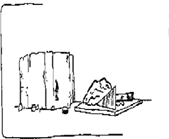
I am my Brother's Keeper
"thou shalt not kill" Ex. 20:13
6
One
Two
Three
Four
Five
Six
Seven
Eight
Nine
Ten
We are not good at keeping the things God gives us. Adam was asked to keep the garden and look where we are today. Remember the Sabbath day to "keep" it holy. We are not very good at keeping things. Here is something else we must "keep." I am to be my brother's keeper. No man is capable of keeping the ten commandments. Even after conversion we find it impossible to live in such a state of perfection.
The Christian life involves breaking ground and beginning again. It involves finding God's blueprints for the New life and following them carefully. It involves faith and you being where God wants to live. These are the Foundations of a "faith life." If God is going to live in you, He will change the neighborhood. When God moves in He "brings His stuff." The evidence that God lives in us is our "Testimony." God's Spiritual presence changes everything.
Eph. 2:8-9 speaks about "good works." Notice it does not say "by" good works. We are saved by Grace. How can others see that God is in and working in our lives? Look for the love (Jn. 13:35). We are people in Love. The Ten Commandments are not so much a goal as they are a gage and a guide. As a gage they make it clear that "all have sinned and come short of the glory of God." And to any who might foolishly consider the possibility of reaching such an impossible goal, Jesus made it clear when he spoke to the rich young ruler, "that there is none good but God." Theologically, the Ten Commandments are a teacher which lead us to God, or more precisely to see our need for God. Practically speaking, the Ten Commandments are a guide. The law came by Moses, grace and truth came by Jesus Christ. He was the only one to ever have lived the commandments, for he was God incarnate. He fulfilled the law in life and in death. The very same commandments that condemned us confirmed Christ to us as holy.
It is only by the grace of God that we are what we are, and that we might ever hope to be what we should be. We shall never be sanctified by a law that could not save us. Yet the ten commandments were written for our good. They were written on the conscience of men long before they were written in stone. Every memory and heart still has faint traces of truth in that he knows what is right and wrong. But time has so faded the ink of this internal reminder of holiness that it can barely be seen. But it is there. When the conscience is held up in just the right way before a certain kind of light, enough of God's law is legible to still cause guilt when violated, and conviction when considered. Every society has attempted to reconstruct these moral guiding principles. Every heart knows that it is wrong to murder. Men everywhere know that it is wrong to steal. Many are ill equipped to explain why, but they just know it is.
Jesus gave us his commentary on the sixth and seventh commandments. For while Moses may have given us the height, Jesus gave us the depth and width. It is not enough that we do not have the actual blood of a brother on our hands, we must beware of having it upon our hearts. It has been said of old that "thou shalt not kill, but I say unto you: he that hateth his brother without cause shall be in danger of the judgment..." Matt. 5:22 As a skilled carpenter knew how to use "just the right" tool, Jesus used the law like no other before. He showed the utter hopelessness of anyone attempting to earn salvation by doing good works or keeping the commandments. It is only when one turns from Sinai in despair and brokeness, that he may lift an eye Mt. Calvary and see God's gift.